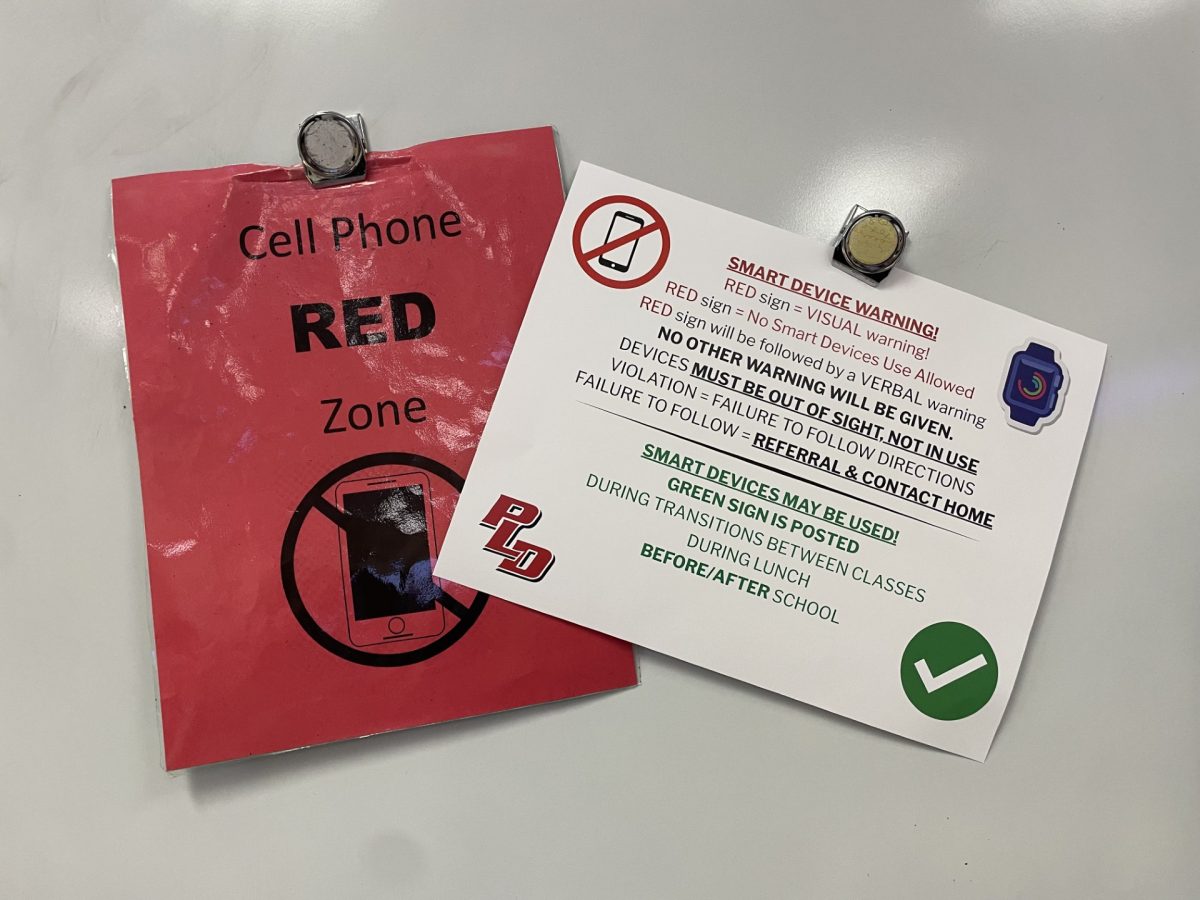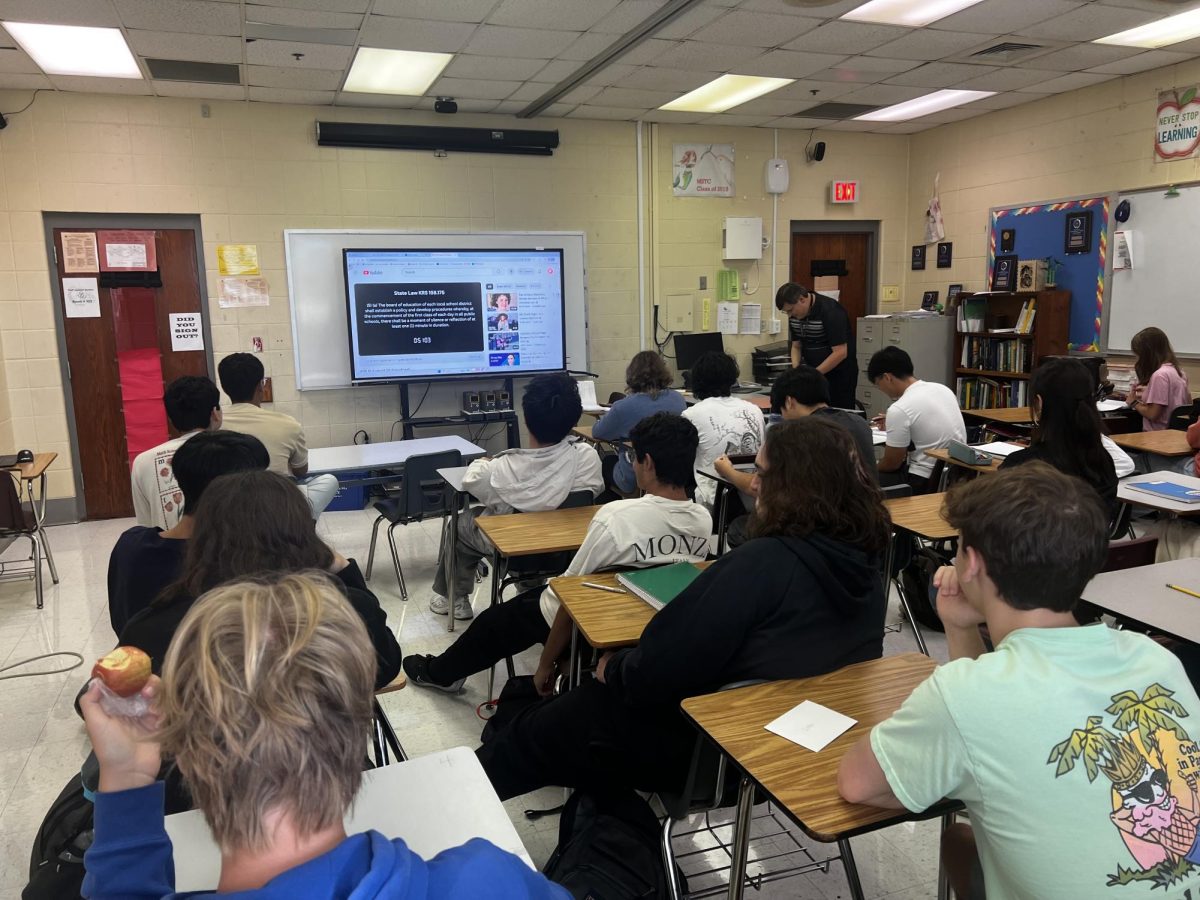In Mar 20, 2025, the Kentucky General Assembly passed House Bill 208, mandating that all public school districts develop policies to restrict student use of personal telecommunication devices such as cell phones during instructional time. Signed into law by Governor Andy Beshear on March 24, the legislation aims to minimize distractions and enhance student engagement and focus in classrooms.
This law requires the school board to adopt a policy prohibiting students from using personal telecommunications devices during instructional time.
Exceptions are allowed for emergencies, teacher-directed activities, or when specifically authorized by the teacher present. This approach gives districts flexibility to tailor policies to their specific needs while maintaining a consistent statewide standard. Dunbar has expanded its already established behavioral expectations to meet the standards. The new policy utilizes red and green signs to indicate when telecommunication devices are acceptable and not. The biggest change is that phones are fully banned from hallways during instructional time, so if a student goes out of class for a bathroom pass, they cannot take their phones.
In contrast, Jefferson County Public Schools are requiring students to place their phones in backpacks, paper bags, or school-provided containers—some of which are locked and unlocked using special magnets–during the entire duration of the school day. Even though Dunbar is allowing some leniency, the administration believes it is making a difference.
“The new policy has decreased distractions in the hallways and restrooms,” administrative dean Mrs. Lyndsey Thurston said. “They are clear and used for their true purpose. Students are no longer in the hallway to get a glimpse of their phones.”
Associate Principal Mr. Paul Richardson agrees. He said that he believes it will be a valuable tool in making day-to-day life run more smoothly in the building.
“I do believe it is helping with behavior management,” he said. “We are here to make sure that the kids are safe, and not having phones out is definitely having an impact.”
Students, however, have expressed mixed reactions.
“Not having my phone all the time has made me pay attention more when the teacher is teaching, but it doesn’t really change the way I work,” sophomore Finnley Comfort said. “Most teachers allow green zone time, and when they don’t, it just feels wrong—like if I am not going to focus, having my phone doesn’t change much.”
Sophomore Nana Nyamekye shared a similar concern.
“It kind of doesn’t make any sense to me,” she said. “I get that phones are a distraction, but sometimes it actually helps me focus. Not having music makes it really hard for me to focus, especially in loud classrooms.”
To help students who like to listen to music while working, some teachers have created class playlists. Each student gets to pick a song to include, and the teacher can play the music for the whole class during individual work time. Many teachers say that they are finding ways to be creative and help students break bad habits like being on their phones during instruction.
“Overwhelmingly, people have been following the new policy,” history teacher Mrs. Kathryn Bilkha said. “Being able to say that it is a law helps students tend to take it more seriously, massively increasing engagement.”
Teachers have also noticed changes in the classroom environment.
“I feel like my classroom is more engaged,” math teacher Mr. George Jacks said. “I feel like I can have a stronger relationship with students because they are not constantly distracted by technology.”
These benefits are also translating to the library.
“Kids are getting more than one [book], they are reading faster since they have more downtime, increasing book circulation at Dunbar,” librarian Mrs. Amber Faris said.
She said that she noticed it has also impacted student interaction.
“Students are having more human contact, having real conversations with each other,” she said. “I see and hear about things going around near them rather than what’s happening in their phones.”
According to an interview with WLKY, Rep. Anne Donworth (D) said that she supports the bill.
Studies have shown that excessive use of “unnecessary” technology in classrooms can lead to decreased attention spans, lower test scores, and increased anxiety among students. By limiting phone use during instructional time and giving teachers the freedom to regulate it according to their individual needs, bill sponsor Josh Bray said, “the goal is to create a more focused and productive learning environment.”
For more information on House Bill 208 and its provisions, visit the Kentucky Legislative Research Commission’s official page
























